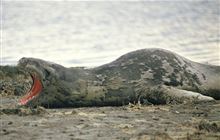Leopard seal provoked
Archived content: This media release was accurate on the date of publication.
Introduction
Owha, the leopard seal, has been seen at ferry terminals, marinas, boat ramps and beaches in Auckland and Northland for the last four years.Date: 01 October 2019
“The vast majority of people have enjoyed seeing this magnificent wild animal from a safe distance,” says DOC Auckland marine ranger Gabrielle Goodin.
“So, it’s disappointing to receive a photo of a man standing in front of Owha, at an unsafe distance, provoking a ‘warning’ response from her.”
The photo is one of a series taken at Taipari Strand in west Auckland. They show Owha was provoked by the man while she was resting on a pontoon.
“Owha displayed a series of warning behaviours to indicate to the man she felt threatened. When the man persisted with his actions, Owha responded by leaving the pontoon and swimming away,” says marine scientist Brittany Mathias, a member of the LeopardSeals.org team.
“This man put himself at risk by standing close to Owha and provoking her. She’s a large, wild animal and could have harmed him but instead moved away.”
This man also runs the risk of prosecution as leopard seals are protected by the Marine Mammals Protection Act 1987.
Under this legislation, it’s an offence to disturb, harass, harm, injure or kill any seal. A dog owner, whose dog attacks a seal, could also face prosecution.
Anyone charged with harassing, disturbing, injuring or killing a seal faces a maximum penalty of two years’ imprisonment or a fine to a maximum of $250,000.
DOC is keen to talk to the man in this photo, taken on the Taipairi Strand boat ramp in Te Atatu.
If you know who this man is, can you please phone the DOC hotline 0800 362 468.
What should people do when they see Owha?
People can safely watch Owha, onshore, if they follow these simple rules:
- stay at least 20 metres away from Owha
- keep small children under your control and a safe distance from Owha
- keep your dog on a short leash, under your control and a safe distance from Owha
- avoid getting between Owha and the sea.
- Do not make loud noises and do not provoke her
How did she get the name Owha?
While Leopard seals live mainly in Antarctic waters in pack ice, they are known to travel northward, and New Zealand is part of their normal range. Leopard seals are a native New Zealand species and are found right around our coastline. Leopard seal sightings peak in spring.
Owha is unusual because she is the longest tracked leopard seal in the world. DOC and NIWA marine biologist Dr Krista Hupman, and her team at LeopardSeals.org, have been tracking Owha’s movements for the last seven years. She was first sighted off the Dunedin coast in 2012.
Owha moved north and was sighted off the Northland coast, at Ruakaka, in June 2015. She’s spent the last four years living on Northland’s east coast and in Auckland’s Waitemata Harbour.
In recognition of this rare occurrence, Ngāti Whātua Ōrākei has named this leopard seal, He owha nā ōku tupuna, or Owha for short. This means treasured bequest or gift from our ancestors.
If you see Owha or any other leopard seal, report the date and location of your sighting to:
LeopardSeals.org: You can do this by:
- Phone: 0800 LEOPARD / 0800 536 7273
- Facebook: Leopard Seal sightings NZ
- Email: info@LeopardSeals.org
Contact
For media enquiries contact:
Email: media@doc.govt.nz

